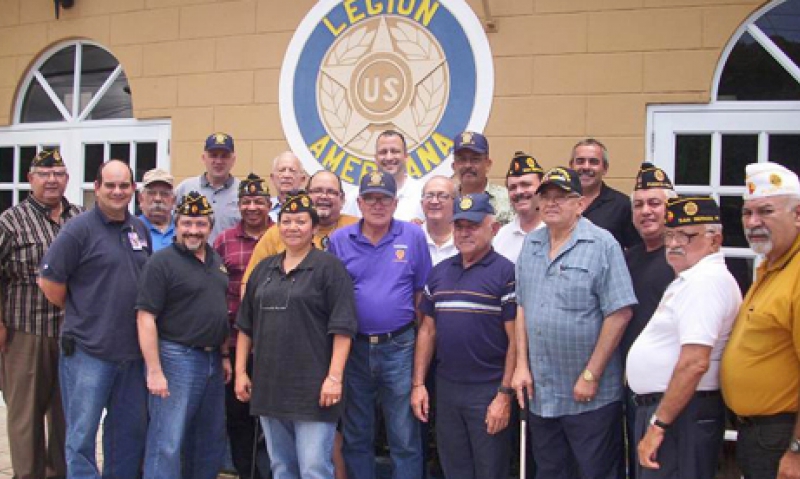
Taking the training to Puerto Rico
Veterans Affairs & Rehabilitation Division Principal Deputy Director Steve Smithson and Assistant Director Ian de Planque conducted week-long training for volunteer American Legion service officers in the Department of Puerto Rico recently. The training was tailored to providing a fundamental understanding of the claims process, as well as how to work with veterans to provide the information up front to win their benefits and understand their entitlements.
Puerto Rico has a veterans' population of almost 200,000 - many of whom are in rural locations with difficult access to needed veterans resources. In an environment such as this, the importance of American Legion volunteers in the community is of great importance. These are the people on the front lines of serving veterans, the people who embody the service component of American Legion membership. Nearly 50 service officers attended the training; almost all operate at a post or district level. The training was organized into two sessions of two full days each to serve the different geographical regions of the island.
The training ranged from a simple understanding of the basic mechanics of benefits claims and filing procedures to more in depth instruction on key areas of concern for the veterans' population. Training on Agent Orange (herbicides) focused on current events impacting those claims for veterans.
The Department of Veterans Affairs is in the process of adding three new conditions to the list of conditions presumptively associated with Agent Orange. These three conditions - Ischemic Heart Disease, Parkinson's disease, and B-Cell Leukemias, such as Hairy Cell Leukemia - are expected to impact over 200,000 veterans nationwide in the coming year alone, with many more such claims to follow. The Legion training was tailored to provide a better understanding not only of the conditions, but of the mechanisms by which VA awards service connection and therefore the best means to get veterans who suffer from these conditions connected through VA so they may receive their earned compensation and health care.
Post-traumatic Stress Disorder is another topic of concern among veterans, not only from the present wars in Iraq and Afghanistan, but dating back to Vietnam, Korea and before. VA is in the process of changing regulations for one of the more difficult requirements that veterans face in claims for PTSD: the proving of the occurrence of an in-service stressor. The training focused on how to help veterans with proving these events, in previous cases as well as with the changes in regulations moving forward. Furthermore, the important role that veteran role models in the community, such as The American Legion, can play in removing the stigmas associated with this disorder was also a key teaching point. Veterans who suffer from PTSD can benefit greatly from treatment; however, misunderstandings and inaccuracies in popular portrayals of PTSD suffers in the media and the entertainment fields often prevent those veterans who might benefit from seeking treatment. In situations such as this, the role of The American Legion in the community to present a positive image that addresses the facts and not myths about a misunderstood disorder such as this is crucial to serving veterans.
The training further provided extensive information regarding non service-connected pension, in addition to the traditional compensation benefits that are more familiarly recognized. Veterans who served during a period of war, and who are faced with limited means due to disability or age, are eligible for a base pension even if there is no service-connected disability. In situations such as this, the subsistence payments involved in pension can often make the difference between homelessness and getting by for the most financially hard hit of veterans. This is of further importance, as medical bills and rising continuing care costs for aged veterans are factored into equations. VA has recently consolidated all management of pension claims into three offices in St. Paul, Minn.; Milwaukee; and Philadelphia. The Legion staff provided training on how to calculate eligibility for pension, how to protect veterans and ensure they are getting the benefit best able to address their financial needs, and how to interact with the national Legion staff in those offices to get help for the veterans in the communities that they serve.
Overall, the training provided an intensive yet still user-friendly set of guidelines to be utilized at an introductory or more advanced level. The impact will be increased as those Legion volunteers who attended this training return to their communities and disseminate the useful information to those veterans they come into contact with. The chief challenges faced within the claims system are the large amount of misunderstandings and misconceptions present in the general public. With a greater understanding of the actual applicable laws and regulations that are relevant to the claims, a greater level of success is possible. It is a well-documented fact that veterans represented by service organizations have a much higher rate of receiving benefits than those veterans who have no representation. This stems largely from the fact that the complicated system requires navigation by trained and experienced service officers. To provide that training is one of the most important functions that the Legion can implement to ensure all veterans are receiving the benefits to which they are entitled.
